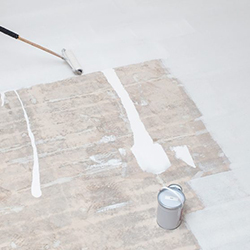Are Resin Bound Training Courses any Good?

'You can't learn anything from a resin bound training course!' is the mantra of the 'Keyboard Warrior Resin Experts.' Are they correct? No. Obviously experience helps and can be save time, but the most important factors involved in laying a resin bound driveway correctly are attitude, approach and understanding of the fundamentals.
Overconfidence (and problems) from a section of the 'Resin Experts' is common. It's anecdotal, but I'd say the success ratio of resin bound training course graduates is higher than the traditional 'know it all' resin expert.
And I don't just say this because we offer training courses. Our training courses are not a profit making venture. They're not charitable either....we make money from competent contractors gaining regular custom and therefore we get regular custom. But we don't offer courses for the sake of it.
Our experience shows that contractors who attend courses will almost always do a good job. They have one thing in common...they usually care about doing a good job of the resin bound installation. And in resin bound, that's 90% of the battle....maybe more!
Laying a resin bound screed is not like laying an epoxy resin screed, a Ucrete UD200 floor or a microcement screed (and just because you can do that doesn't mean you'll be a great resin boud contractor).
Resin bound screeds are relatively straightforward to trowel apply. Good jobs are created from attitude and approach combined with a complete understanding of the fundamentals.
To put my theory to the test, I asked my team the top 5 issues they come across when talking to people about resin bound. A lot of our products, resin bound sealers and our 1m2 kits especially, are used to repair resin bound installations gone wrong. So for that reason we speak to a lot of people who have had a poor installation carried out (not using a Vuba product).
Here's the top 5 problems I got back:
1) My resin bound is starting to crumble, do you have anything to strengthen the aggregate?
Reason: Usually the problem is insufficient thickness or incorrect mixing.
Resin bound has to be laid at a minimum of 2.5 x the thickness of the largest aggregate in the mix. What happens when it's laid at 8mm? It's too thin to gain sufficient strength, and the matrix of the resin bound breaks down.
Insufficient or incorrect mixing. The ratio of resin to aggregate in resin bound is only 6-8%, if part of your resin doesn't quite fully permeate the aggregate, you will get resin poor areas. These resin poor areas will begin to crumble.
Cause: Carelessness or scrimping on material. Yes, experienced contractors will be able to 'feel' the correct thickness more easily than a new contractor, but there are methods to ensure you are laying the screed at the required depth.
Would a Vuba course help? Yes. The course explains the chemistry behind the minimium thicknesses we have in our industry, and techniques to not fall foul of this. For example - you can use screeding lats set at 12mm, 15mm or 18mm, or you can spray out the area to designate how far a mix should go at the correct thickness. Experience is not a big factor in this problem - so long as you understand the fundamentals you should be able to do it correctly.


2) My resin bound has different colour shades / 'banding' in areas, do you have a sealer that will cover it?
Reason: Overmixing of resin bound aggregate can cause darker shading in mixes. Overmixing causes breakdown of aggregate in the forced action mixer, creating a mist of aggregate powder which permeates throughout the blend. Alternatively, overmixing after the resin has been added to the mix can cause resin burn, and again darken a mix.
Cause: Lack of preparation, lack of correct mixing equipment or insufficient operatives for the job to keep momentum flowing.
Would a Vuba course stop this? Yes. We teach that each mix time must be consistent, that gravity mixers cannot be used, and that each mix procedure should be identical. The course focuses on the regular pitfalls that are seen, and how to avoid them in both the theoretical and practical aspects of the course.
3) My resin bound has gone yellow / green, do you have a sealer for my resin bound to bring the colour back?
Reason: The contractor has installed a none UV stable resin bound screed.
Cause: To save money (usually).
Would a Vuba course stop this? Yes, we foster a culture of doing the right thing by customers, and building a repuatation. A listing on our Approved Contractors List is dependent upon inspection of a completed project, and on the basis of completing regular successful projects.


4) The edge of my resin bound is starting to crumble away at the front of my driveway - can I buy a kit to fix this?
Reason: Usually if an exposed edge of the resin bound is left to be hit by traffic at the front of a driveway.
Cause: Carelessness or time saving.
Would a Vuba course stop this? Yes, we discuss how to terminate resin screeds in all circumstances. Whether that is excavating at perimeters to allow the resin to 'tow in' and maintain thickness without sitting proud, or if that is using our profiles.
5) My resin bound is cracking, do you have anything I can repair or fill this with?
Reason: Cracks in resin bound are typically replicating a crack or joint in the substrate that hasn't been treated correctly, or has perhaps worsened.
Cause: Occasionally cracking caused by excessive substrate movement is not the fault of the contractor - especially if they didn't install the subfloor. However, most of the time these joints and cracks can be correctly treated prior to application of the resin bound surfacing.
Would a Vuba course stop this? In the course we teach attendees how to correctly combine new and old slabs, how to join different subfloor structures and also how to induce an expansion joint in the resin bound screed if required.

Whether or not your Granddad was a floor layer doesn't mean you have the monopoly on laying resin bound screeds.
The point I'm trying to make in this blog is that 90% of a resin bound project going great is simply down to organisation, knowledge of the fundamentals and a desire to do a good job.
And from our courses you do get a knolwedge of the fundamentals - you know exactly what you should be doing each step of the way.
Here's a link to our resin boud training courses page. Our most popular course 'Resin Bound: The Fundamentals' is run twice a month and is incredibly popular. Our graduates have gone on to complete 100's of great projects.
The courses run from 9.30am to 3.30pm on a Friday or Saturday. They cost £180 + VAT which you are able to pay 50% upfront and 50% on the day. Check out our social media for more updates about the courses we run.
Thanks for reading...and the next blog posts will move on from the resin bound keyboard warrior!
Sean Scott
Managing Director
Vuba Chemical Innovations Limited




 sales@easi-hold.com
sales@easi-hold.com



